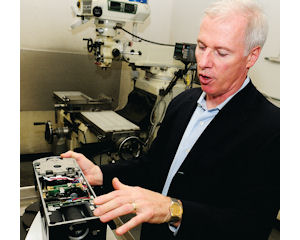McBain Systems is in the business of making small objects appear large. The Simi Valley company is the leading distributor – in a vast area that stretches from California through the southwest to Louisiana – of industrial microscopes made by Leica Microsystems AG. Most people know the Leica name for its high-end cameras with stellar optics, made by a separate firm spun off from the same German predecessor company. Similarly, Leica Microsystems sets the gold standard for its product. McBain microscope systems start at less than $100,000 for a manual version and go for up to $200,000 for semi-automated equipment – to more than $1 million for models that can run on their own around the clock. Their lenses are capable of five times to 1,000 times magnification. McBain’s close association with Leica has been good for the distributor, which had $9.78 million in revenue in 2011. That amounted to a 22 percent increase since 2009, enough to place it at No. 44 on the Business Journal’s list of Fast Growing Private Companies. McBain employs 37 workers, most working in the field as salespeople or technicians. Where is the demand coming from? McBain serves a diverse customer base ranging from defense industry heavyweights such Boeing Corp. to medical device makers, oil and gas companies, and food manufacturers. Others customers include medical schools and law enforcement agencies with forensic labs. Medtronic Diabetes in Northridge, a subsidiary of Medtronic Inc. of Minneapolis, uses McBain-supplied microscopes for inspection and failure analysis on its insulin pumps and blood sugar monitors, which are implanted in the body. “We just purchased a few more,” said Rudy Montalvo, a consultant with Medtronic Diabetes. “We are doing a project for (the Juvenile Diabetes Research Foundation) and we needed more equipment to support that program.” But while the distribution business has been good for McBain, that is not what owner and Chief Executive Michael Crump expects will drive future growth. He is counting on the engineering side of the business, particularly in designing and building equipment incorporating microscopes. An example of that is a system with robotic technology that repeatedly checks silicon semiconductor wafers during the manufacturing process. It incorporates infrared cameras. Such systems can sell for $1 million or more. “My engineering (sales) could easily double or triple just on the back of one customer ordering multiple systems,” said Crump, who expects word-of-mouth among manufacturers will build sales. “That is how it starts multiplying.” Innovative offerings McBain started in 1965 as McBain Instruments – named for founder and UCLA track star Carl McBain – and grew to become one of the nation’s largest microscope distributors. But by the time Crump and a group of business partners bought the company in 1997, growth had stalled. So Crump, who bought out his partners by 2000, decided to reinvest in the engineering business, which McBain had abandoned years earlier. A former executive at Japanese camera and optics manufacturer Olympus Corp., Crump decided to develop innovative products and full systems that not only captured images with the microscopes but could analyze them with sophisticated software. The move was reflected in a name change from McBain Instruments to McBain Systems. “We are a very different company than what it was in 1997,” said Crump. He hired an operations manager with a background in production equipment and a sales manager who could make capital equipment deals to make the transition. Engineering services is vital to McBain’s future because it is not under the same constraints as the microscope distribution business that is dependent on the product Leica makes available – or to a geographical territory. “I’m not limited where I can sell my engineering products,” Crump said. A new venture that McBain has joined demonstrates the company’s reach. In Quebec, McBain is installing its $1.6 million DDR 2000 semiconductor-inspection machine, a proprietary device incorporates an infrared microscope. The machine was acquired by the MiQro Innovation Collaborative Center, a state-of-the art facility that is developing and commercializing new semiconductor technology. The center is a collaboration between private companies, including McBain, IBM Corp. and Teledyne Dalsa –a subsidiary of Teledyne Technologies Inc. of Thousand Oaks. Crump is considering having a full-time employee based at the center starting in 2014, an important step to serving Canada and the Northeastern United States. “With someone there doing demos and meeting with customers it is a growth opportunity,” he said.
